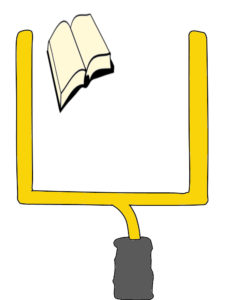I’m a football fan. Apparently that’s somewhat rare in the world of writers. I love a lot of different sports, including baseball, golf, basketball and swimming. By some crazy coincidence I am writing this post smack in the middle of the NFL playoffs. And this month’s Fictorian’s theme is all about goals.
So, this post is about goals, ergo, it is the goal post. See what I did there?
OK, I’m sorry. Still, it’s a decent lead in, and the sports reference is useful too. Because I happen to be one of those people who think goals are a critically important part of life. Goals give us something to strive for, something to measure our performance against, and something to appreciate when they are achieved.
Sports is famous for setting goals. If you talk to just about any world-class athlete, they will pepper you with their goals. Each goal achieved is one more step forward in their quest to achieve the greatness to which they aspire. Each goal achieved opens the door to new goals beyond.
I approach writing that way. Well, I approach a lot of things that way. But writing is one of them. That doesn’t mean I always achieve goals, but if I don’t achieve a goal, I don’t abandon my dreams, I re-calibrate and reset. Then I work toward my new goals. The more goals I achieve, the closer I am to the dreams I have.
Goals can be far-reaching and ambitious, like “I’m going to write a novel.” Or they can be direct and practical, like “I’m going to write 1,000 words tonight.” Then, the next night, “I’m going to write 1,000 words tonight.” If you string enough successful 1,000 word nights together, you can achieve your over-arching goal, “I’m going to write a novel.”
When I started writing, I used to keep a spreadsheet of how many words I wrote every night. I had nightly, weekly, and monthly goals for words written. If I came up short one night on a nightly goal, I could buckle down the next night and get back on track for a weekly goal.
Some people give themselves rewards for reaching goals. That’s fine, it probably helps some people, but for me the main reward for reaching a goal was… you guessed it, reaching the goal.
I’m just now wrapping up my fourth novel. I’m already planning my fifth. I remember when my loftiest goal was “I’m going to write a novel,” and that goal seemed light-years away and nearly impossible to reach. In truth, it wasn’t really that much effort, it was mostly all about sticking to my goals until I achieved them.
One of my favorite Robert Browning quotes is “Ah that a man’s reach should exceed his grasp, or what’s a heaven for?” That’s one way of saying that goals can help us achieve great things. It’s similar to “Reach for the stars, if you fall short, you might still reach the moon.”
Set some goals. Make them specific. Make them meaningful. Track your progress. Reward your successes. That’s not a bad way to get through life in general, and it just might finish that novel you’ve been working on forever.






